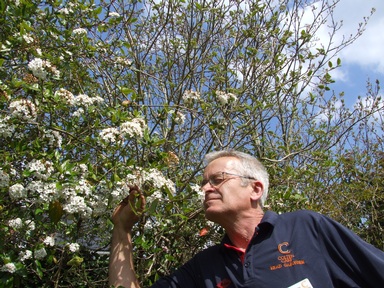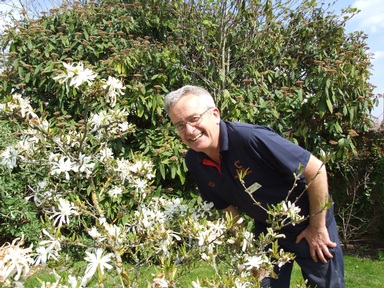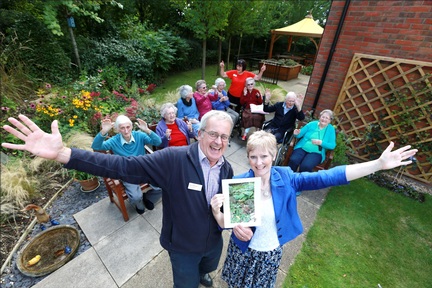Dementia gardener says: 'We take favourite plants of residents to their bedside'
For the current generation living with dementia in care homes, gardens have a key role in reminiscence therapy.

Charles Hubberstey is the head gardener at Colten Care Ltd and oversees all twenty of the homes' gardens. The horticulturalist has a ‘dementia friendly’ and ‘ecological’ approach to gardening where possible, but above all, he says: “Our gardens are safe – and the homes' boundary is the fence and not the garden door”.
‘Plants and gardening are a rich source of memory’
It is the early involvement of gardening in a person’s life that holds the key for unlocking later memories during the treatment of dementia. Charles says: “Our gardens play a very important role in helping our residents live with dementia. Dementia progresses through various stages, and at all stages there are cognitive benefits from horticulture. Our gardens are designed to be safe and inviting."
Charles explains how he also uses reminiscence therapy through the home’s gardening clubs. He says: “In the early stages a resident may be able to choose and arrange a colour arrangement for a planter, and plants and gardening are a rich source of memory, conversation and interaction, whereas in later stages, we may even take plants to a resident in bed – to touch, and smell and maybe recognise.”
There are frequent garden clubs in all of the group's homes, often with up to 15 residents at a time, many of whom are regulars. As well as being used for dementia therapy, they are also a lifeline for more independent residents, who benefit from increased social opportunity and being outdoors within nature, and they often have a word of advice for Charles. He laughs: “Of course many residents have a word or two of advice for the gardeners, and I will listen also if there."
He continues: "I’ve learned tricks about keeping squirrels off our crocus bulbs, the best time to cut box hedging, tips for a great compost heap, watering tomatoes…and the list goes on.”
‘Head Gardener? I can do that!’
Charles didn’t start his first gardening job until 1983. Having a social work qualification and looking for work dealing with youngsters leaving care, he stumbled into horticulture as a means of making cash in December of that year.
 Within three months he had decided to stick at horticulture, and like his gardens, his career flourished. He says: “I enjoyed getting up in the morning. I worked as a landscape gardener, then became self-employed in 1987, and worked constructing and maintaining public and private gardens.”
Within three months he had decided to stick at horticulture, and like his gardens, his career flourished. He says: “I enjoyed getting up in the morning. I worked as a landscape gardener, then became self-employed in 1987, and worked constructing and maintaining public and private gardens.”
One evening, in 2011, whilst at home, Charles saw a job advertised with Colten Care, and it said: “Wanted – Head Gardener” and he thought "I can do that, why not?". He adds laughing, "so, here I am!".
When dealing with vulnerable, or less mobile residents, there are certain safety boxes that need ticking, as Charles explains: “Obvious precautions will be taken regarding poisonous plants, open water or other hazards, but the benefits of fresh air and nature are especially important for our residents with dementia. I encourage an ‘open door’ policy for all our homes.”
As well as residents, Charles is always happy to take advice from other gardeners. He says there are “quite a few gardeners with a background in the nursery business who have passed their skills on”. As a result, he says: “Hundreds – or even more possibly – of annuals and herbaceous plants are propagated on site.”
Also serving as decoration for the homes, the gardens need to have ‘kerb appeal’ and the front doors require ‘a colourful approach’, but they also need to be at their best all year round, and with this in mind, all of the Colten Care gardeners meet up twice a year for training and networking; some gardeners are up to 100 miles apart.
Rosie Yeomans from Gardener’s World and Gardener’s Question Time speaks at the Colten Care events, where the gardeners talk about topics of concern or interest in the morning, with afternoons spent discussing subjects such as health and safety and other more corporate considerations.
‘As gardeners we often feel over thanked’
Charles always tries to stay abreast of developments within the trade generally, and recently he has been looking at their environmental approach.
Their home at Sherborne is now completely organic, with no chemicals having been used within the grounds for over three years.

‘Environmental’ gardening is clearly something Charles cares passionately about. The homes only use weed killer where absolutely necessary. He says: “We take a rigorous approach to the use of weed killers in the homes, restricting use to severe problem areas that can’t be tackled by hand, and occasional weed control to large areas of hard standing – i.e. car parks.”
Their next target is the horticultural use of plastic. Charles says: “Two of our suppliers are now accepting our old pots for recycling, and the gardeners themselves are coming up with ways to reduce our plastic consumption – something that the horticulture trade in general needs to seriously tackle.”
Charles loves his job and thinks frontline care workers probably get less appreciation for the work they do as the results are less obviously on display. He says: “We all take so much satisfaction from watching people react positively and warmly to our work. Indeed, sometimes we feel ‘over-thanked’; there are many jobs in a care home where maybe those who do the work receive less personal gratitude."
When asked about what he loves most about the job, he says: “It still makes my day when a lady or gentleman thanks me for the wonderful garden and all the hard work that goes into it.”
To find out more about care home jobs, search here
Latest Features News
 25-Nov-19
2019 Election: Boris Johnson leaves social care in 'too difficult box' but Labour vows to end 'crisis'
25-Nov-19
2019 Election: Boris Johnson leaves social care in 'too difficult box' but Labour vows to end 'crisis'
 18-Oct-19
Podcast: Wendy Mitchell and dementia: 'My biggest fear is not knowing who my daughters are'
18-Oct-19
Podcast: Wendy Mitchell and dementia: 'My biggest fear is not knowing who my daughters are'
 27-Sep-19
Exclusive: Care minister backs care workers' call for time off to grieve and attend funerals
27-Sep-19
Exclusive: Care minister backs care workers' call for time off to grieve and attend funerals
 19-Sep-19
Podcast: Gyles Brandreth says poetry helps ward off dementia
19-Sep-19
Podcast: Gyles Brandreth says poetry helps ward off dementia
 30-Aug-19
Edinburgh Fringe funnyman joins comics facing toughest audience at care home gig
30-Aug-19
Edinburgh Fringe funnyman joins comics facing toughest audience at care home gig